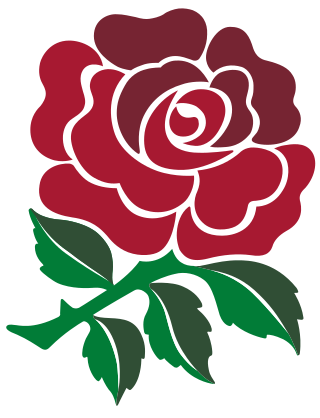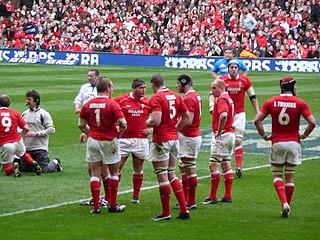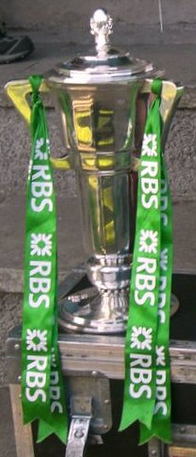
The England men's national rugby union team represents the Rugby Football Union in men's international rugby union. They compete in the annual Six Nations Championship with France, Ireland, Italy, Scotland and Wales. England have won the championship on 29 occasions, winning the Grand Slam 14 times and the Triple Crown 26 times, making them the most successful outright winners in the tournament's history. They are currently the only team from the Northern Hemisphere to win the Rugby World Cup, having won the tournament in 2003, and have been runners-up on three further occasions.

The Scotland national rugby union team represents the Scottish Rugby Union in men's international rugby union. The team takes part in the annual Six Nations Championship, where they are the current Calcutta Cup and Doddie Weir Cup holders. They also participate in the Rugby World Cup, which takes place every four years.

The 2007 Six Nations Championship was the eighth series of the rugby union Six Nations Championship. Including the previous incarnations as the Home Nations and Five Nations, this was the 113th series of the international championship. Fifteen matches were played over five weekends from 3 February to 17 March.
The 1978 Five Nations Championship was the forty-ninth series of the rugby union Five Nations Championship. Including the previous incarnations as the Home Nations and Five Nations, this was the eighty-fourth series of the northern hemisphere rugby union championship. Ten matches were played between 21 January and 18 March. The tournament was contested by England, France, Ireland, Scotland, and Wales. The championship was won by Wales, their twentieth outright win in the competition. The Welsh had shared another nine titles with other teams. Having won all four of their games, Wales also won the Grand Slam for a record eighth time - Wales had formerly shared the record of seven with England. Victories over England, Ireland and Scotland, also meant Wales won the Triple Crown for the third consecutive time, a record, given no other team had ever won the Triple Crown more than twice in a row. It was Wales' fifteenth in total, also a record, surpassing the fourteen won by England.

The 2008 Six Nations Championship, known as the 2008 RBS 6 Nations because of sponsorship by the Royal Bank of Scotland, was the ninth series of the rugby union Six Nations Championship, the 114th series of the international championship.
The French national rugby union team first competed at the 1900 Summer Olympics.
The 1995 Five Nations Championship was the 66th Five Nations Championship, the annual Northern Hemisphere rugby union competition contested by the national teams of England, France, Ireland, Scotland and Wales. It was also the last Five Nations held in the sport's amateur era, as rugby union's governing body, the International Rugby Football Board, opened the sport to professionalism on August 26 of that year. Including the previous incarnations as the Home Nations and Five Nations, this was the hundred-and-first series of the northern hemisphere rugby union championship. Ten matches were played over five weekends from 21 January to 18 March. It was also the fifth occasion, after 1978, 1984, 1990 and 1991, on which two teams each with three victories faced off against each other in the final round of matches, with both capable of completing a Grand Slam with a victory, and the second time that the Triple Crown had also been at stake at the same time, as a result of England and Scotland's earlier victories over the other Home Nations. The tournament took a surprisingly similar course to five years earlier, where England and Scotland both won their first three matches and met in the final week, with an undefeated record, a Grand Slam, Triple Crown and the Calcutta Cup all at stake for the victor: however, this time it was England who prevailed in the deciding match. Even the minor placings were the same as in 1990, as France came third, Ireland fourth and Wales were whitewashed.
The 1994 Five Nations Championship was the 65th series of the Five Nations Championship, an annual rugby union competition between the major Northern Hemisphere rugby union national teams. The tournament consisted of ten matches held between 15 January and 19 March 1994.

The 1993 Five Nations Championship was the 64th series of the Five Nations Championship, an annual rugby union competition between the major Northern Hemisphere rugby union national teams. The tournament consisted of 10 matches held between 16 January and 20 March 1993.
The 1992 Five Nations Championship was the 63rd series of the Five Nations Championship, an annual rugby union competition between the major Northern Hemisphere rugby union national teams. The tournament consisted of ten matches held between 18 January and 21 March 1992.
The 1991 Five Nations Championship was the 62nd series of the Five Nations Championship, an annual rugby union competition between the major Northern Hemisphere rugby union national teams. The tournament consisted of ten matches held between 19 January and 16 March 1991.
The 1980 Five Nations Championship was the 51st Five Nations Championship series of the annual rugby union competition contested by the national teams of England, France, Ireland, Scotland, and Wales. Including the previous incarnations as the Home Nations and Five Nations, this was the 86th series of the northern hemisphere rugby union championship. The tournament began on 19 January and concluded on 15 March.

William Rex Willis was a Welsh international rugby union scrum-half who played club rugby for Cardiff and invitational rugby for the Barbarians. He won 21 caps for Wales and was selected to play in the British Lions on the 1950 tour of Australia and New Zealand.
The 2013 Six Nations Championship, known as the 2013 RBS 6 Nations because of the tournament's sponsorship by the Royal Bank of Scotland, was the 14th series of the Six Nations Championship, the annual northern hemisphere rugby union championship. It was contested by England, France, Ireland, Italy, Scotland and Wales.
The history of the Ireland national rugby union team began in 1875, when Ireland played its first international match, a 0–7 loss against England. Ireland has competed in the Six Nations rugby tournament since 1883. Ireland has also competed at the Rugby World Cup every four years since its inception.
The 2017 Six Nations Championship was the 18th series of the Six Nations Championship, the annual northern hemisphere rugby union championship. The tournament was also known as the RBS 6 Nations because of the tournament's sponsorship by The Royal Bank of Scotland Group.
The 2018 Six Nations Championship was the 19th Six Nations Championship, the annual international rugby union tournament for the six major European rugby union nations.
The 2019 Six Nations Championship was the 20th Six Nations Championship, the annual rugby union competition contested by the national teams of England, France, Ireland, Italy, Scotland, and Wales, and the 125th edition of the competition.
The 2021 Six Nations Championship was the 22nd Six Nations Championship, the annual rugby union competition contested by the national teams of England, France, Ireland, Italy, Scotland, and Wales, and the 127th edition of the competition. Due to the COVID-19 pandemic, the tournament started just three months after the end of the previous tournament and all matches took place without spectators.
The 2022 Six Nations Championship was the 23rd Six Nations Championship, the annual rugby union competition contested by the national teams of England, France, Ireland, Italy, Scotland, and Wales, and the 128th edition of the competition. Wales entered the tournament as defending champions.





